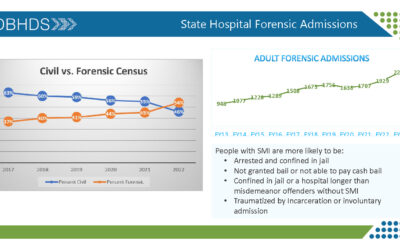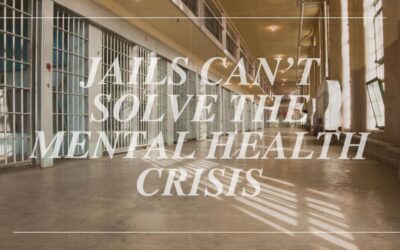August 20, 2019
Mental Health America of Virginia – Remarks at Virginia State Crime Commission’s Public Hearing re: Special Legislative Session on Guns
Mr. Chairman, Members of the Commission:
My name is Bruce Cruser, Executive Director of Mental Health America of Virginia. Formerly the Mental Health Association, we are the oldest non-profit mental health advocacy organization in the state.
As mental health advocates, we don’t generally take positions on gun bills, but today I want to express two of our goals related to your work: Reducing suicide, and protecting the rights of someone living with a mental illness.
First, I want to state a few facts about mental illness: 1
- Most people who engage in acts of violence don’t have a mental illness.
- It’s estimated that at least 1 in 5 adults have a mental illness, and most of them will never engage in violence.
- Individuals with mental illnesses are much more likely to be the victim of violence than the perpetrator.
- Simply put: Mental illness doesn’t cause violence, but violence is a cause of mental illness.
We oppose HB 4024 because it categorically lumps anyone with a certain mental health diagnosis into a separate classification with restricted rights, regardless of their individual behavior risk.
We don’t want anyone in need of treatment to avoid it because of a fear of being branded, discriminated against or fired.
You heard earlier today that 65 percent of gun-related deaths in Virginia are suicides.2 Those gun-related suicides have risen steadily for 20 years, so that today over half of the suicides in Virginia involve a firearm.
Studies show that the best way to prevent suicide is to remove the lethal means to do so.3 When a gun is used the fatality rate is over 80%, compared with a far less lethal rate for other methods. Individuals contemplating suicide often do so impulsively, and if they survive that first attempt, they are more likely to get treatment and much less likely to try again in the future.
We support legislation that helps decrease the risk of suicide by firearm as long as it is based on behavior, not on someone’s health diagnosis.
Several states have passed versions of Extreme Risk Protection Orders (ERPOs). These laws provide for someone to ask the court in a civil proceeding to temporarily remove a firearm from someone who is an imminent risk to themselves or to others. The petition may be from a law enforcement officer, concerned family member or a medical professional, depending on the state.
The removal is temporary, with the best versions of these laws having due process built in at each step. For example, you can’t be denied your gun simply because you have a mental health diagnosis.
The evidence on suicide prevention suggests that we should consider Extreme Risk Protection Orders, with due process protections for individual rights, including the rights of anyone with a mental illness.4
SB 4012 and HB 4003 are worth close examination because they appear to strike the right balance, with protections and reviews central to the process.
17 states have now enacted some form of ERPOs, and they have broad public support. They save lives, and prevent suicides.
Thank you.
References:
1 See Mental Health America Position Statement 72 https://www.mentalhealthamerica.net/positions/violence
2 Virginia Office of the Chief Medical Examiner (Annual Report 2017)
3 Harvard Injury Control Research Center, Harvard School of Public Health (website)
4 Jeffrey Swanson, PhD, Duke University School of Medicine (Washington Post, 8/11/2019, B4 Outlook): [Note: Swanson’s research team found that in Connecticut and Indiana for every 10 to 20 gun-removal actions under ERPO laws, a life was saved through an averted suicide. The individuals in these states who were subject to the gun removal law proved to be those more likely to attempt suicide. The removal order is often a connection to treatment. In Connecticut, the proportion of gun-removal subjects who were receiving outpatient mental health treatment doubled the year after their guns were temporarily removed.]



